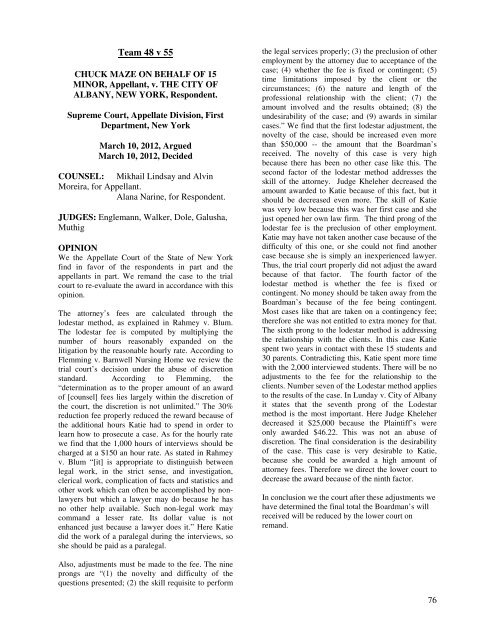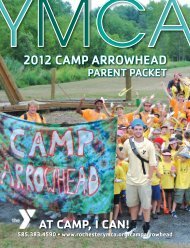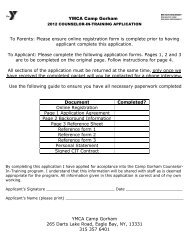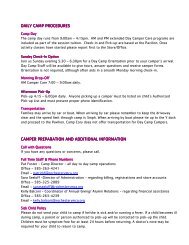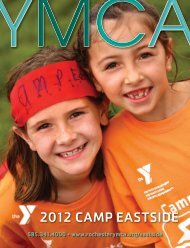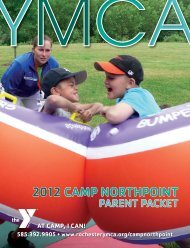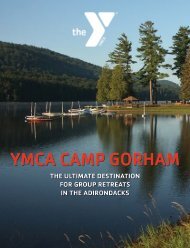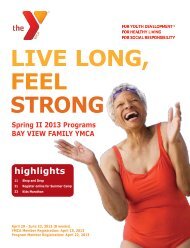2012 Conference Executive Record Report.pdf - YMCA of Greater ...
2012 Conference Executive Record Report.pdf - YMCA of Greater ...
2012 Conference Executive Record Report.pdf - YMCA of Greater ...
You also want an ePaper? Increase the reach of your titles
YUMPU automatically turns print PDFs into web optimized ePapers that Google loves.
Team 48 v 55<br />
CHUCK MAZE ON BEHALF OF 15<br />
MINOR, Appellant, v. THE CITY OF<br />
ALBANY, NEW YORK, Respondent.<br />
Supreme Court, Appellate Division, First<br />
Department, New York<br />
March 10, <strong>2012</strong>, Argued<br />
March 10, <strong>2012</strong>, Decided<br />
COUNSEL: Mikhail Lindsay and Alvin<br />
Moreira, for Appellant.<br />
Alana Narine, for Respondent.<br />
JUDGES: Englemann, Walker, Dole, Galusha,<br />
Muthig<br />
OPINION<br />
We the Appellate Court <strong>of</strong> the State <strong>of</strong> New York<br />
find in favor <strong>of</strong> the respondents in part and the<br />
appellants in part. We remand the case to the trial<br />
court to re-evaluate the award in accordance with this<br />
opinion.<br />
The attorney’s fees are calculated through the<br />
lodestar method, as explained in Rahmey v. Blum.<br />
The lodestar fee is computed by multiplying the<br />
number <strong>of</strong> hours reasonably expanded on the<br />
litigation by the reasonable hourly rate. According to<br />
Flemming v. Barnwell Nursing Home we review the<br />
trial court’s decision under the abuse <strong>of</strong> discretion<br />
standard. According to Flemming, the<br />
“determination as to the proper amount <strong>of</strong> an award<br />
<strong>of</strong> [counsel] fees lies largely within the discretion <strong>of</strong><br />
the court, the discretion is not unlimited.” The 30%<br />
reduction fee properly reduced the reward because <strong>of</strong><br />
the additional hours Katie had to spend in order to<br />
learn how to prosecute a case. As for the hourly rate<br />
we find that the 1,000 hours <strong>of</strong> interviews should be<br />
charged at a $150 an hour rate. As stated in Rahmey<br />
v. Blum “[it] is appropriate to distinguish between<br />
legal work, in the strict sense, and investigation,<br />
clerical work, complication <strong>of</strong> facts and statistics and<br />
other work which can <strong>of</strong>ten be accomplished by nonlawyers<br />
but which a lawyer may do because he has<br />
no other help available. Such non-legal work may<br />
command a lesser rate. Its dollar value is not<br />
enhanced just because a lawyer does it.” Here Katie<br />
did the work <strong>of</strong> a paralegal during the interviews, so<br />
she should be paid as a paralegal.<br />
the legal services properly; (3) the preclusion <strong>of</strong> other<br />
employment by the attorney due to acceptance <strong>of</strong> the<br />
case; (4) whether the fee is fixed or contingent; (5)<br />
time limitations imposed by the client or the<br />
circumstances; (6) the nature and length <strong>of</strong> the<br />
pr<strong>of</strong>essional relationship with the client; (7) the<br />
amount involved and the results obtained; (8) the<br />
undesirability <strong>of</strong> the case; and (9) awards in similar<br />
cases.” We find that the first lodestar adjustment, the<br />
novelty <strong>of</strong> the case, should be increased even more<br />
than $50,000 -- the amount that the Boardman’s<br />
received. The novelty <strong>of</strong> this case is very high<br />
because there has been no other case like this. The<br />
second factor <strong>of</strong> the lodestar method addresses the<br />
skill <strong>of</strong> the attorney. Judge Kheleher decreased the<br />
amount awarded to Katie because <strong>of</strong> this fact, but it<br />
should be decreased even more. The skill <strong>of</strong> Katie<br />
was very low because this was her first case and she<br />
just opened her own law firm. The third prong <strong>of</strong> the<br />
lodestar fee is the preclusion <strong>of</strong> other employment.<br />
Katie may have not taken another case because <strong>of</strong> the<br />
difficulty <strong>of</strong> this one, or she could not find another<br />
case because she is simply an inexperienced lawyer.<br />
Thus, the trial court properly did not adjust the award<br />
because <strong>of</strong> that factor. The fourth factor <strong>of</strong> the<br />
lodestar method is whether the fee is fixed or<br />
contingent. No money should be taken away from the<br />
Boardman’s because <strong>of</strong> the fee being contingent.<br />
Most cases like that are taken on a contingency fee;<br />
therefore she was not entitled to extra money for that.<br />
The sixth prong to the lodestar method is addressing<br />
the relationship with the clients. In this case Katie<br />
spent two years in contact with these 15 students and<br />
30 parents. Contradicting this, Katie spent more time<br />
with the 2,000 interviewed students. There will be no<br />
adjustments to the fee for the relationship to the<br />
clients. Number seven <strong>of</strong> the Lodestar method applies<br />
to the results <strong>of</strong> the case. In Lunday v. City <strong>of</strong> Albany<br />
it states that the seventh prong <strong>of</strong> the Lodestar<br />
method is the most important. Here Judge Kheleher<br />
decreased it $25,000 because the Plaintiff’s were<br />
only awarded $46.22. This was not an abuse <strong>of</strong><br />
discretion. The final consideration is the desirability<br />
<strong>of</strong> the case. This case is very desirable to Katie,<br />
because she could be awarded a high amount <strong>of</strong><br />
attorney fees. Therefore we direct the lower court to<br />
decrease the award because <strong>of</strong> the ninth factor.<br />
In conclusion we the court after these adjustments we<br />
have determined the final total the Boardman’s will<br />
received will be reduced by the lower court on<br />
remand.<br />
Also, adjustments must be made to the fee. The nine<br />
prongs are “(1) the novelty and difficulty <strong>of</strong> the<br />
questions presented; (2) the skill requisite to perform<br />
76


